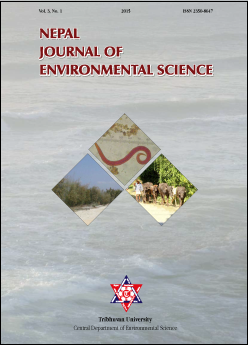Climate change impacts in agriculture: A case of Makrahar Village, Rupandehi, Nepal
DOI:
https://doi.org/10.3126/njes.v3i0.22734Keywords:
Adaptation, climate change, food securityAbstract
Nepal ranks fourth in the world with respect to climate change vulnerability. The country has been experiencing extreme climatic events causing crop failure and food deficiency. The extent of impact varies with location, production environment the quality of services, and crop plant species. The present study was conducted to assess the impacts of climate change on agriculture and food security in a village of Rupandehi district of South Western Tarai region of Nepal. The standard methods and tools were used to assess climate change impacts on agriculture, food security and farmers' practices. Peoples' perceptions were gathered through household surveys, focus group discussions and key informants’ interviews. Secondary information was garnered through the review of literature, official records and personal communications. The climatic data were further validated with people’s perceptions. The analysis of climatic data record from1984 to 2013 revealed a declined precipitation, but mean air temperature was consistently rising. Change in timing, intensity and distribution of rainfall also caused shifting of crop calendar. Such extreme climatic trends along with dry spells for extended period, lowering water sources and increased infestation of crop pest and diseases affected crop performance. Heat and cold waves also affected crops yields. Farmers still lack access to proper adaptation options and support to adapt the climate change impacts. Inadequate irrigation and drainage facilities, public services and policy supports unavailable in times of stress have made farmers and farming system more vulnerable in Makrahar. Institutional support to facilitate local vulnerable people should be increased for better adaptation.
Downloads
Downloads
Published
How to Cite
Issue
Section
License
This license enables reusers to distribute, remix, adapt, and build upon the material in any medium or format for noncommercial purposes only, and only so long as attribution is given to the creator.

